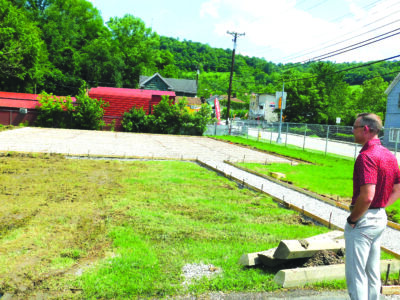Decision on St. C. water coming to a head

T-L Photo/ROBERT A. DEFRANK Paula Koch of Reservoir Road holds up jars of discolored water during last Monday’s St. Clairsville City Council meeting. Councilman Frank Sabatino observes. She and other residents and city leaders say action must be taken regarding water service. During the Sept. 16 meeting, St. Clairsville may face the choice of privatization versus attempting to retain local control, with the first reading of a bid to purchase the system, and the first reading of a resolution to study the system for options and costs to keep possession.
ST. CLAIRSVILLE — At the Sept. 16 council meeting, city leaders may be looking at two choices for the future of water and wastewater service: whether to sell the aging system to the privately-owned Aqua Ohio, or to seek options for continued local control.
“By our meeting Sept. 16, hopefully … all negotiations will be done and there will be an ordinance or resolution…brought before council for first reading for the acceptance of the bid from Aqua,” Mayor Terry Pugh said during an interview Wednesday.
Pugh said the finalized agreement should be completed this week, and council members will have the opportunity to review the terms before the first reading.
But during last week’s city council meeting, officials heard a presentation from the Rural Community Assistance Partnership about potential funding possibilities for loans to make targeted repairs. Councilwoman Beth Oprisch said she would work on preparing a resolution for the Sept. 16 meeting calling for a study of St. Clairsville’s water service for options and costs.
Councilmen Perry Basile, Mike Smith, and Council President Tim Porter, also a mayoral candidate, have also expressed doubts about privatization.
Protestors led by mayoral candidates Bill Brooks and Kathryn Thalman, and some opposing council members, have said Pugh’s administration is moving too quickly in proceeding with Aqua Ohio, the state-regulated entity which has expressed an interest in purchasing it.
Pugh has indicated the opposition is using manufactured delays and obstruction.
“It’s just stalling tactics. All these council members have had plenty of opportunity over three years to come here and meet with myself and (Safety and Service Director) Jim Zucal,” Pugh said.
Zucal said he has been talking to council about the water situation since 2016.
“They’ve been well-informed. … I agree with the mayor, it’s a stalling tactic,” Zucal said. “We want to provide clean, safe drinking water at a fair price. What this other group is advocating, their cost ration will end up with doubling of the rates.”
Water rates will increase no matter which route the city takes. The proposed bid from Aqua Ohio would mean an increase totaling $4.13 from 2020 to 2026 with increments of $1, $1.67, 71 cents and 75 cents. After 2026 there would be an incrase of up to 9.9 percent, with increases of 3.75 percent for 2027, 2028, and 2029.
Zucal had said if the city retained local control, in order to apply for grants and loans the minimum rate increase would be between 1.8 and 2.3 percent of the median household income, which is $68,000, and the EPA recommending 2.5 percent.
However, the RCAP spokeswoman said there may be lower options, if factors such as water use are taken into account.
“There are loans out there. The problem is loans are always somebody else’s money that you have to pay back,” Zucal said.
Zucal and Pugh have stressed the advantages of Aqua Ohio are the capital and expertise the private company would be able to devote to upgrading the system.
If the city attempted to build a new water plant, a $20 million loan would be necessary, Zucal said.
“The debt service on a $20 million loan would be a little over $700,000 per year. We don’t have $700,000,” Zucal said, also pointing out the cost of maintenance for the plant. “To take on loans and do what they want to do will cause the rates to double.”
Pugh said the city’s current overall debt was $7.5 million and St. Clairsville faces other needs, such as street paving and a project to alleviate flooding on Bellevue Street. He said the proposed deal with Aqua Ohio would assist in paying for that work.
“We’ve got to follow through on more projects that have already been engineered,” he said. “If we go into debt like this, I don’t know where we get funding for anything.”
If the first reading is Sept. 16, the third reading and vote would be mid-October. If passed, the agreement would go into effect 30 days afterward. Then Aqua Ohio would seek approval from the Public Utilities Commission of Ohio to take over the water system.
“Before Aqua would actually take the system, we’re looking into next year,” Pugh said.
If city leaders vote for a water study, it would likely take about 90 days and cost possibly $10,000 to $20,000. Council members who have spoken for a study have said it may turn out privatization is the best option after all.
This Nov. 4, the residents will have a four-way choice in the mayoral race.





